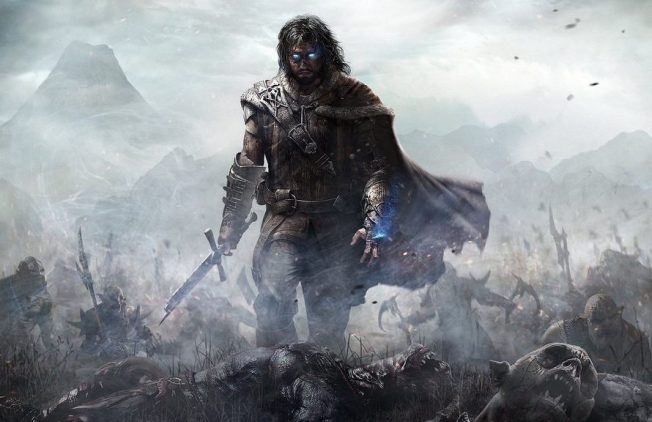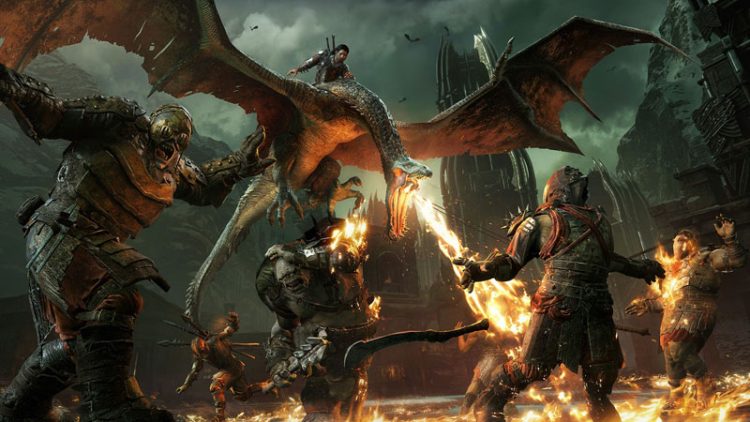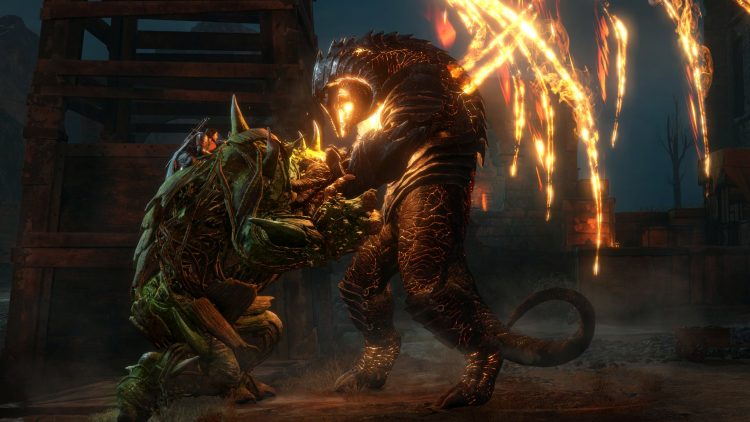Middle-Earth: Shadow of War is a sequel to the hugely successful 2014 sleeper hit, Shadow of Mordor. The game played fast and loose with Tolkien’s lore about as often as it adopted key gameplay mechanics from the likes of Assassin’s Creed and Arkham Asylum. It’s no surprise the title was a runaway success, it felt like an AAA experience from the first minute; throwing the awe-inspiring Nemesis system into the mix further improved its replayability and gave players a world in which to create their own mini-narratives. A few years later we’re handed an ambitious sequel in the form of Shadow of War – but is it too much, too soon?
Game Name: Middle-Earth: Shadow of War
Platform(s): Xbox One (reviewed), PS4, PC
Publisher(s): Warner Bros
Developer(s): Monolith Productions
Release Date: October 10th, 2017
Price: £39.10 (Amazon)
The game continues from where the original left off, with the Gondorian ranger Talion and the spirit of elf lord Celebrimbor continuing to pursue Sauron in an effort to free Middle-Earth from his grasp. Having forged a new Ring of Power, Celebrimbor finds himself at the mercy of a sexy-witch-like embodiment of Shelob (you remember, the giant pale spider thing) who uses him as leverage to ascertain the ring from Talion. It eventually transpires that the three key players all share a common enemy in Sauron and aspire to work together to vanquish their foe. As this takes place between the events of The Hobbit and Lord of the Rings, it’s pretty evident that this mission may not be a successful one – however, what ensues is a fantastic (if a little overlong) storyline full of more twists and turns than an Agatha Christie omnibus.
Gameplay-wise, Shadow of War is an enormously strong offering of huge combat skirmishes, impressive quick-time set-pieces and varied gameplay types (riding Drakes & a completing a sequence involving a Balrog were amongst some of my most enjoyable moments in-game). The combat takes a natural step forward from its predecessor, with melee attacks and bow-fire feeling as varied and responsive as ever. There’s an in-game skill tree which allows you to upgrade and advance your standard and special attacks; at first, its presentation feels intimidating, yet after a few hours it becomes second nature as you decide which components of Talion you want to enhance.
Shadow of War heartily embraces the open-world execution during its 30-ish hour runtime (trust me, there’s plenty of quests and Nemesis sub-narratives to keep you occupied throughout your entire Christmas break) and although Monolith Productions have done a fantastic job diversifying every section of the map – most of its inhabitants feel massively repeated and recycled. That’s not necessarily a bad thing, enemy diversity has never been so impressive as it is here – with new versions of Orcs, War Trolls, armored Caragors and fire-breathing Drakes lining every path you opt to take.
The Nemesis system has also evolved massively, meaning the world in which you play through is now 100% specifically tailored to your actions. You now have ‘Followers’, who bring with them their own set of narratives of loyalty and revenge. Thousands of Orcs swarm each location, each captained by a particularly well-rounded Chief – ranging from anything from a sorcerer to a ballad-singing bard (the latter being my personal favorite). Sometimes this can become overwhelming, particularly if you’re trying to sprint to your next location or hunt a foe that’s been bothering you for some time. Out of nowhere you can feel ambushed, and despite your companions often coming to your rescue – the weight of the game feels enormous.
Ultimately your objective here is to turn the majority of Middle-Earth against Sauron, but deciding whether or not to execute a Captain who has previously murdered you or make him your personal slave is a tougher choice than you’d anticipate. Even regular grunt orcs might deliver the final blow on you, meaning they may become a local hero and earn a captaincy that they otherwise might not have had. It’s one of the most in-depth gameplay mechanics I’ve ever experienced and despite the occasional overwhelm of enemies on screen at any given time, Monolith’s Nemesis system is executed to near perfection. Although I ended up killing more Captains than I did recruit them, there are far more benefits to sparing them than we ever saw in Shadow of Mordor. They can now command troops in some of the games’ enormous jaw-dropping battles or even become turncoat spies! Once they’re noticed by their peers, they may become another Warchief’s personal bodyguard. Wait for exactly the right moment and BAM! – they’ve done all the dirty work for you.
This sequel is among one of the most ambitious I’ve played, from its in-depth campaign through to its incredible presentation (admittedly, it looks better on the PC/PS4 Pro compared to the Xbox One on which I reviewed it). The lighting, draw distance, diversity in locations and motion capture performances are top notch – they all have a particular blockbuster quality to them that you rarely see in games like this nowadays. The game may tread into some silly territory (i.e standing a hulking, flaming demon atop an icy lake without it immediately melting) and take some liberties with iconic characters such as Isildur and Shelob – but for any Tolkien fan this is hopefully the sort of expansion you’d look forward to playing. It’s clear that Michael Aigner, Mike de Plater and the entire production team have a fondness for Tolkien’s legendarium and the level of detail that goes into every piece of armor, weaponry and location is staggering.
There is a small question regarding in-game microtransactions, but unlike a game such as FIFA 18 – which demands you pay to have a better gaming experience – Shadow of War almost does its best to help you avoid them. It’s as if its embarrassed by them, handing you enough loot and fun ways of earning upgrade-currency so that you’ll never have to be duped into paying real money for more. Their existence might cause you to huff, but they won’t affect your appreciation of the game in anyway.
Overall, Shadow of War is an absolutely breathtaking spectacle that seems to be available at a bargain price at the moment. Its only flaw is that it might be too big, too ambitious – but that could be said of titles such as Grand Theft Auto V and since when has that ever been a bad thing? Repetition gets slightly grating – granted, but huge boss sections and crazy fortress fights break up those moments of play at regular intervals. The combat is slick and responsive, (if a little clunky when you’re teamed up on by hundreds of Orcs) and the Nemesis system feels even more developed than its practically-flawless predecessor.
Shadow of War is a near-perfect experience for fans of blockbuster action games; much like The Lord of the Rings trilogy itself – if you can stomach a lengthy runtime and in-depth narrative, this is the game for you.
Overall
Despite the odd lull in gameplay, repetitive objective or feeling as though there’s too much scale weighing you down – Shadow of War is completely inspirational in the way it’s attempting to further narrative storytelling in videogames. The overarching storyline involving Talion is an engrossing one yet that almost becomes a sub-plot in itself – second to the mini meta-narratives you’ll create amongst the factions of Orcs and Warchiefs you meet along the way. The voice acting and motion capture performances are really solid and the presentation is glossy and big-budget; it’s as close to actually being in Middle-Earth as you’re ever going to get. I’m about as swept up in this game as a Drake riding off into a fiery sunset; fantastic.
-
Overall





